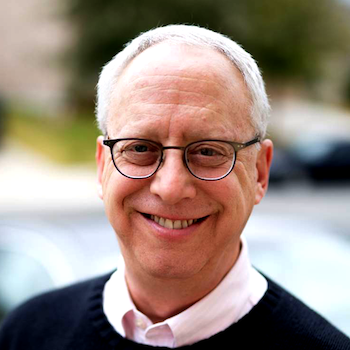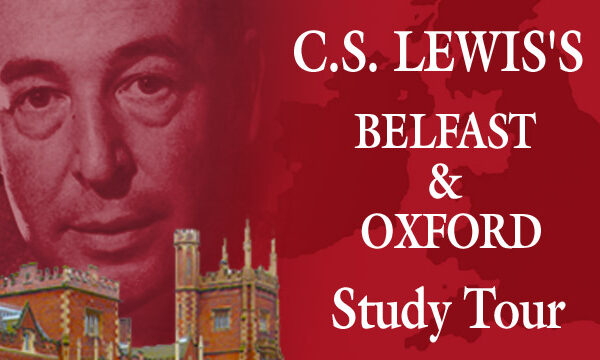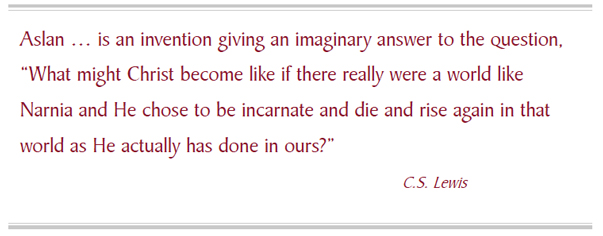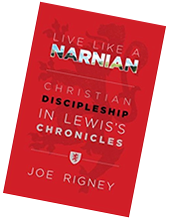Back to series


Download or Listen to Audio
Turning Conversations about C. S. Lewis to the Topic He Loved Most
Click here to open a Print - Friendly PDF
I once heard someone say he wanted to be able to converse with anyone about anything. I was intrigued. He reasoned that joining in on a conversation of the other person’s choosing could express respect, interest, and care for that person.
Since then I’ve wondered if I could do the same—with the hope of using a conversation about anything to point people to the most important thing. Could I see how any topic connected to the gospel? Better still, could I actually transition from talking about any topic to one about Jesus without it seeming rude or just plain weird?
Granted, there must be limits to this. In fact, I remember, as a young believer, finding a book that boasted it could help Christians turn “any conversation” into a gospel conversation. The problem was that the suggested dialogues sounded more like conversational hijackings than genuine concern for people.
One suggested dialogue went like this:

The telephone rings.
You: Hello?
Caller: Hello, may I speak to Bill?
You: Oh, I’m sorry. There’s no Bill here. You must have the wrong number.
Caller: Oh, I’m so sorry. Please forgive me.
You: Well, maybe it’s not really a wrong number! Maybe God intended you to call this number. Maybe He wanted you to hear how you could know Him in a personal way.
Caller: click.
You: Hello? Hello? Are you there?
Actually, the book didn’t say the other person hung up. I just couldn’t imagine he wouldn’t! But if God really is the “maker of heaven and earth” (in other words, everything!), shouldn’t there be connections between all of life to eternal life? Couldn’t casual chats about earthly things become significant conversations about heavenly ones?
Those of us who love C.S. Lewis are always challenged by his famous quote, “I believe in Christianity as I believe that the Sun has risen, not only because I see it, but because by it, I see everything else.”1 If “by it” we see everything else, shouldn’t that change the way we talk about everything else?
 If you’ve ever told someone that you’ve read something by C.S. Lewis or that you like his writing or have seen one of the Narnia movies, you may have found that many people have a positive view of him.
If you’ve ever told someone that you’ve read something by C.S. Lewis or that you like his writing or have seen one of the Narnia movies, you may have found that many people have a positive view of him.
Asking people what books they read might lead them to ask you about your reading choices.
Lately, I’ve had several opportunities to transition conversations about C.S. Lewis to discussions about God. I’ve found them to be fruitful; I hope they will be used by the Lord to have people consider life beyond the wardrobe.
Here are five suggested ways to transition from C.S.L. to J.C.
First, we can inform people that the same guy who wrote the Narnia books for children wrote religious books for adults. Many people don’t know this. (More copies of Lewis’s Narnia books have been sold than all of his other books combined!) People who have fond memories of a land that opened up from the back of a wardrobe might have fewer defenses than others about religion. They might be open to hear about God from the same writer who decades ago made their imaginations soar.
 Second, I like to tell people that Lewis thought deeply about all of life, and so he helps me think more deeply about my life. Austin Farrar, a close friend of Lewis’s once said that he was the most thoroughly converted man he had ever met. This is no surprise once we learn how Lewis was trained rigorously for debate by his tutor, William Kirkpatrick, often called “the Great Knock.” Lewis had to defend every idea and conclusion he ever uttered to Kirkpatrick, thus honing skills of careful thought and precise expression. Any reader of Lewis’s nonfiction will recognize and appreciate the training he received. I tell people that Lewis has helped me reflect more deeply about my life, my family, my job, the world around me, and a million other topics. I sometimes ask people, who has shaped your thinking the most? It escalates the quality of the conversation significantly. I find that many people who rarely talk about things other than the weather, sports, or (Lord, have mercy!) politics are open to, even eager for, deeper conversation.
Second, I like to tell people that Lewis thought deeply about all of life, and so he helps me think more deeply about my life. Austin Farrar, a close friend of Lewis’s once said that he was the most thoroughly converted man he had ever met. This is no surprise once we learn how Lewis was trained rigorously for debate by his tutor, William Kirkpatrick, often called “the Great Knock.” Lewis had to defend every idea and conclusion he ever uttered to Kirkpatrick, thus honing skills of careful thought and precise expression. Any reader of Lewis’s nonfiction will recognize and appreciate the training he received. I tell people that Lewis has helped me reflect more deeply about my life, my family, my job, the world around me, and a million other topics. I sometimes ask people, who has shaped your thinking the most? It escalates the quality of the conversation significantly. I find that many people who rarely talk about things other than the weather, sports, or (Lord, have mercy!) politics are open to, even eager for, deeper conversation.
Third, I sometimes tell people that Lewis helps me see connections between different parts of my life. Eventually I want to tell them about the connections between God and all of life, but I don’t start there. I think many people wonder how the here and now might connect to heaven and forever. But that’s an awkward or alien topic until people first see connections between home and work or entertainment and reality or the mundane and the important. Theologically this is because the same God who made our physical world also gave us souls and minds to grasp unseen things. Our society typically ignores these links, but we should try to encourage our friends to see things differently. Owen Barfield once said about Lewis that “somehow what he thought about everything was secretly present in what he said about anything.”2 Wouldn’t it be great if some of our friends wondered what we thought about everything (especially God) when they heard us talk about anything?
Fourth, Lewis put his finger on something that I find many people feel but can’t articulate—that all of life has some element of disappointment. They wish it didn’t but they can’t seem but to experience letdown on a regular basis. Lewis said this was the major theme of his life. But he turned the theme upside down by calling it “joy.” Consider how I once used this topic to talk to a skeptic. Here’s how part of our conversation went:
 Me: Lewis helped me with my wonderings—whether life had any meaning. He spoke a lot about disappointment. Every experience has a certain amount of disappointment to it. Whether it’s an experience, a relationship, a goal. For me, it was music. I thought I was going to find some piece of music that was going to be the piece that would always satisfy. But I never found it.
Me: Lewis helped me with my wonderings—whether life had any meaning. He spoke a lot about disappointment. Every experience has a certain amount of disappointment to it. Whether it’s an experience, a relationship, a goal. For me, it was music. I thought I was going to find some piece of music that was going to be the piece that would always satisfy. But I never found it.
He: I think, for me, it was a relationship that I thought would always satisfy.
Me: Right. Relationships, experiences, beauty—they all promise more than they can deliver. Lewis said that people tend to respond to that disappointment in one of three ways. They can keep trying to find a new thing that won’t disappoint. Or they can become cynical . . . He (interrupting me by raising his hand): That’s me— the cynic!
Me: Well, Lewis says there’s a third way. It’s the way that says, “If I find in myself a desire which no experience in this world can satisfy, the most probable explanation is that I was made for another world.”3
He: Interesting.
Me: The combination of Lewis’s chapter titled “Hope” in Mere Christianity and Matthew’s book in the New Testament made all the difference in the world for me. Matthew convinced me that Jesus was the Messiah, and he opened the way for me to find that other world that Lewis said I was looking for.
For anyone who has felt the pang of “maybe life is meaningless,” the gospel is good news indeed and a radical contrast to either hedonism or nihilism, the two worldviews that, for some, seem like the only options.
Finally, I love to talk to people about how Lewis helps me appreciate beauty. Whether it’s in a beautiful melody or a gorgeous painting or a breathtaking sunset or a redemptive ending to a book or movie, Lewis has given me permission to allow the aftertaste of beauty to linger. So much of current culture is despairing or depressing or absurd that many people have given up hoping for goodness or joy. Even the world of stand-up comedy has become dominated by cynicism and insult, mocking the very idea of a happy ending. Ironically, that world is getting less funny and more harsh. (Screwtape must be delighted!)
But the eternity God has planted in people’s hearts won’t allow them to completely abandon the notion that maybe, just maybe, there is such a thing as goodness. Maybe the reason why Lewis’s Narnia books still sell and captivate is because there is an ultimate happy ending in a world that isn’t “always winter and never Christmas.” I love to ask people why they think we can’t stop listening to beautiful music or flock to art museums or rewatch movies with happy endings. Sometimes their answers open them up to consider larger and happier stories. At the end of Lewis’s stimulating sermon The Weight of Glory, he said, “There are no ordinary people. You have never talked to a mere mortal. Nations, cultures, arts, civilizations—these are mortal, and their life is to ours as the life of a gnat. But it is immortals whom we joke with, work with, marry, snub, and exploit—immortal horrors or everlasting splendours.”4
If he was right, I suggest we should never have “ordinary” conversations. Even what some might call “mere chit-chat” can be transformed into conversations with the most weight. Something that starts as seemingly inconsequential as “Hey, what are you reading?” could lead to changes beyond the bookshelf. Lewis thought his writings would be forgotten five years after he died. He couldn’t have been more wrong. For some people, his books have changed eternity. And that’s worth talking about.
|
Notes: |
|||

Randy Newman
Senior Fellow for Apologetics and Evangelism, CSLI
Randy Newman is the Senior Fellow for Apologetics and Evangelism at the C.S. Lewis Institute. He has taught at several evangelical seminaries. After serving for over 30 years with Campus Crusade for Christ, he established Connection Points, a ministry to help Christians engage people’s hearts the way Jesus did. He has written seven books, Questioning Evangelism, Corner Conversations, Bringing the Gospel Home, Engaging with Jewish People, Unlikely Converts: Improbable Stories of Faith and What They Teach Us About Evangelism, Mere Evangelism. and his most recent, Questioning Faith: Indirect Journeys of Belief through Terrains of Doubt. Randy has also written numerous articles about evangelism and other ways our lives intertwine with God’s creation. He earned his MDiv and PhD in Intercultural Studies from Trinity International University.

Recommended Reading:
Joe Rigney, Live Like A Narnian: Christian Discipleship in Lewis's Chronicles (Eyes & Pen Press, 2013)
Careful readers of the Chronicles of Narnia know that there is more to the stories than meets the eye. There are layers of meaning in these fairy tales, spiritual gold beneath these Narnian hills. Those who delight in Lewis's magical world love to journey further up and further in, returning to Narnia again and again so that the same old stories can awaken our minds afresh to the wonder and glory all around us. But just how are these stories meant to change us? When we tumble back out of the wardrobe, in what ways should we be different? Drawing upon Lewis's other writings and the Chronicles themselves, Joe Rigney shows the intricate and sometimes subtle ways that Lewis intended his beloved fairy stories to shape our hearts and minds. In doing so, he commends Lewis's Chronicles as a fruitful part of Christian discipleship, so that in reading the Narnian stories, breathing Narnian air, and seeking to live like Narnians, we are wonderfully transformed into the image of Jesus Christ--the Great Lion and High King Above All Kings.
 COPYRIGHT: This publication is published by C.S. Lewis Institute; 8001 Braddock Road, Suite 301; Springfield, VA 22151. Portions of the publication may be reproduced for noncommercial, local church or ministry use without prior permission. Electronic copies of the PDF files may be duplicated and transmitted via e-mail for personal and church use. Articles may not be modified without prior written permission of the Institute. For questions, contact the Institute: 703.914.5602 or email us.
COPYRIGHT: This publication is published by C.S. Lewis Institute; 8001 Braddock Road, Suite 301; Springfield, VA 22151. Portions of the publication may be reproduced for noncommercial, local church or ministry use without prior permission. Electronic copies of the PDF files may be duplicated and transmitted via e-mail for personal and church use. Articles may not be modified without prior written permission of the Institute. For questions, contact the Institute: 703.914.5602 or email us.
-
Recent Podcasts
A Welcome Change in Apologetics
by Randy Newman, Aimee Riegert on April 19, 2024We’re burdened for our friends who don’t know...Read More
-
Questions That Matter Podcast – Samuel James and Digital Liturgies
by Samuel James, Randy Newman on April 19, 2024
-
The Side B Stories – Dr. James Tour’s story
by Jana Harmon, James Tour on April 12, 2024
-
Recent Publications
Isn’t Morality Relative?
by Christopher L. Reese on April 1, 2024It is widely accepted in the Western world...Read More
-
Do Muslims and Christians Worship the Same God?
by Andy Bannister on March 1, 2024
-
Artificial Intelligence and Its Impacts on Humanity
by John Lennox on February 13, 2024
0
All Booked
0.00
All Booked
0.00
All Booked
20599
GLOBAL EVENT: 2024 Study Tour of C.S. Lewis’s Belfast & Oxford
https://www.cslewisinstitute.org/?event=global-event-2023-study-tour-of-c-s-lewis-belfast-oxford-2&event_date=2024-06-22®=1
https://www.paypal.com/cgi-bin/webscr
2024-06-22

Next coming event
Days
Hours
Minutes
Seconds
GLOBAL EVENT: 2024 Study Tour of C.S. Lewis’s Belfast & Oxford
On June 22, 2024 at 12:00 pmat Belfast, Northern Ireland & Oxford, EnglandSpeakers

Randy Newman
Senior Fellow for Apologetics and Evangelism, CSLI
Team Members

Randy Newman
Senior Fellow for Apologetics and Evangelism, CSLI
Randy Newman is the Senior Fellow for Apologetics and Evangelism at the C.S. Lewis Institute. He has taught at several evangelical seminaries. After serving for over 30 years with Campus Crusade for Christ, he established Connection Points, a ministry to help Christians engage people’s hearts the way Jesus did. He has written seven books, Questioning Evangelism, Corner Conversations, Bringing the Gospel Home, Engaging with Jewish People, Unlikely Converts: Improbable Stories of Faith and What They Teach Us About Evangelism, Mere Evangelism. and his most recent, Questioning Faith: Indirect Journeys of Belief through Terrains of Doubt. Randy has also written numerous articles about evangelism and other ways our lives intertwine with God’s creation. He earned his MDiv and PhD in Intercultural Studies from Trinity International University.






